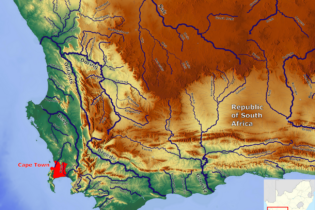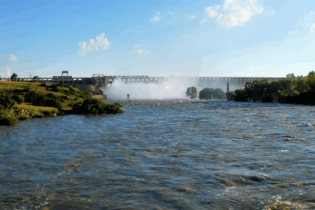Gauteng North High Court judge Moses Mavundla will rule on Tuesday whether Water and Environmental Affairs Minister Edna Molewa , the Department of Water Affairs and eight other government officials and institutions have breached the constitution by failing to supply a Mpumalanga town with potable water.
The dam that supplies water to Carolina — a town of about 17 000 people — is polluted with acid mine water, prompting anger over what residents claim is a failure to provide an alternative. Carolina residents say some of them have had to drink polluted water because of the irregular supply. Department spokesman Mava Scott said they would not comment until Judge Mavundla had delivered his judgment. The community, supported by the Lawyers for Human Rights (LHR) and the Legal Resources Centre, want Judge Mavundla to declare the authorities’ failure to provide potable water for more than seven days as unlawful, and also to direct them to provide the town with a sustained temporary water supply. The municipality argued it had provided a compensatory water supply that amounted to five litres per person per day and that this was sufficient, said director of the Federation for a Sustainable Environment, Koos Pretorius. The federation also supported the residents’ legal bid against the authorities. “We showed that the tankers are irregularly filled and some of them are on private property and not always accessible to the average person. The department said it was prepared to fund the (compensatory) water,” Mr Pretorius said. South Africans were constitutionally guaranteed “sufficient water” and the Water Services Act guaranteed a basic water supply defined as 25l per person per day, or 6kl per household per month at a minimum flow rate of 10l per minute, within 200m of a home, Mr Pretorius said in an affidavit. The act also requires that no one be left without water for more than seven days.This is the second time in a few weeks that the government has been taken to court by citizens demanding the enforcement of rights entrenched in the constitution. Last month, the Gauteng North High Court ruled that the Department of Basic Education had breached the constitution by failing to provide text books to Limpopo pupils.
Carolina’s water problems highlight a looming crisis as the government’s focus has been on broadening access to services, including water supply, at the expense of infrastructure maintenance. Earlier this year, Ms Molewa said it would cost more than R200m to sort out Carolina’s water supply problem. The town’s water treatment plant is not able to cope with acid mine drainage. The Mpumalanga region is coal-rich, but the Department of Water Affairs is battling a backlog in awarding water licences to mines. Of the 69 mines operating without water licences in February, most (23) were in Mpumalanga. This is a criminal offence in terms of the Water Act. The mine seepage in Carolina was linked to four mines in the area, and the Department of Water Affairs is taking action against them. On Monday, the Gauteng North High Court ruled that Harmony Gold must continue paying for pumping and treating acid mine water in and around the Orkney gold mine on the West Rand. Harmony used to own the mine and Judge Tati Makgoka dismissed its application against a 2005 directive by the Department of Water Affairs, ordering it to pay. Harmony sold the mine to Pamodzi Gold in 2007, and Pamodzi went into liquidation in 2009.Source: Business Day






